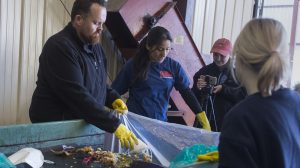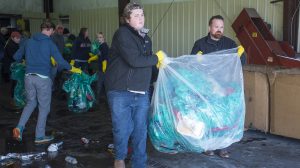
Sorts-Giving volunteers Michael Newsom (from left) and Mariana Anaya sort through recycling items to collect cans and plastic. Photo by Marlee Crawford/Ole Miss Communications
There were cans. So many cans. There were plastic bottles, paper plates and a “Fins Up” button. There were the bones of so many fried chickens, Mississippi’s unofficial state bird.
Among the refuse piles of Ole Miss game days past, there have been high heels, a Brooks Brothers umbrella and even a discarded DVD about fixing a broken marriage, report volunteers with the University of Mississippi Office of Sustainability’s “Sorts-Giving.” The volunteers, who sort game day recycling every year during the university’s Thanksgiving break, have seen just about everything slide down the conveyor belt.
When Ole Miss football fans pack the Grove to tailgate among the oaks, the good times there lead to tons of trash. The Office of Sustainability collects the green bags, which are found throughout the Grove, and sort the cans and plastic from the garbage at the Oxford Recycling Center with the help of volunteers.
I decided to participate in Sorts-Giving this year to help with the leftovers from the Ole Miss-Texas A&M game festivities. It wasn’t my first time. It won’t be my last. I might never eat fried chicken again, though, after seeing what it looks like after being rained on and sitting in a bag outdoors for two days. This is probably a good thing for me. I’ve turned over a new leaf.
Other than changing some of my eating habits, there’s the rewarding sense of doing something important with my time that I get from it. It’s also kind of fun to get out of the office and spend an afternoon with people who believe in a common goal and work together to accomplish it. As we stood out there ripping bags open so we could pull out the treasures, we took turns inventing little stories about how the items got there. I still can’t come up with a good reason why someone would leave her shoes. If you can think of an explanation for this, please let me know.
Besides being a fun, but kind of dirty, diversion, Sorts-Giving makes you think long and hard about what you throw away. Recycling is important work. There’s no federal law that establishes it; city or state governments handle any legislation related to it. There’s the U.S. law, called the Resource Conservation and Recovery Act, which creates a framework for management of hazardous and nonhazardous solid wastes, but other than that, it’s basically left up to us.
IT IS UP TO US – the citizens and our local governments – to do something about the strain on our landfills excess waste causes each day. We make lots of garbage as a nation. That’s why I help out with Sorts-Giving. It’s why others do it, too. People like us have made a difference throughout the country, but we still have too much trash that isn’t being repurposed.
“Despite the high quantity of waste being discarded in over 1,900 landfills across the United States, the country’s recycling rates have been increasing since the 1960s,” the Environmental Protection Agency reports. “In 2014, about the country generated roughly 259 million tons of municipal solid waste.”
The Mississippi Recycling Coalition reports Mississippians annually spend approximately $70 million to dispose of recyclables, which are worth $200 million.

Sortsgiving volunteers work at the Oxford Recycling Center to collect items to be recycled from Ole Miss game day rubbish.Photo by Marlee Crawford/Ole Miss Communications
And there’s room to grow when it comes to making this a priority. A PEW Charitable Trusts survey on environmental issues found perceptions about the issue can vary widely among communities. Only three in 10 Americans said their community strongly encourages recycling and reuse. One-fifth said most people in their area don’t really encourage recycling and the remaining half said they live in places where norms around recycling are in the middle of the survey range. So in short, it’s still not really a big deal to most people.
But, we’ve made strides at Ole Miss. Sorting is part of the university’s Green Grove game-day recycling program, which is usually done by students, many of whom are out of town on Thanksgiving break. The Green Grove program was established in 2008, in collaboration with Landscape Services and the Department of Intercollegiate Athletics. Four student interns in the Office of Sustainability, a team of Green Grove ambassadors and hundreds of volunteers manage it annually.
Last year, more than 400 student volunteers helped out with the Green Grove program, both through engaging tailgaters on game day and by helping sort the collected recyclables, said Lindsey Abernathy, associate director of sustainability and Sorts-Giving maestro.
“Green Grove has grown to be one of our most popular sustainability programs among students,” Abernathy said. “We’ve still got a lot of room to grow, however.
“Our diversion rate is about 3 percent, so there’s a lot of opportunity to increase that number. We try our best to make it easy, convenient and fun to recycle on game day through Green Grove.”
In 2015, when Sorts-Giving last took place, UM employees diverted 1,400 pounds of recyclables from the landfill. As of this writing, the numbers for the 2017 event were still being tallied, but you can bet the total was likely just as much, maybe more.
Ian Banner, university architect and director of sustainability and facilities planning, sums the importance of Sorts-Giving up well.
“A primary focus of the Green Grove program is to provide an engaging and educational volunteer experience to continue to build the recycling program on campus,” he said. “This is an opportunity to have a direct impact on the university’s waste reduction efforts and to learn more about the recycling process in Oxford.”
I heard that, Ian.